Top 5 Keyword research tools for Singapore audience
Today I am going to document the process of doing keyword research for my blog.
I am going to use these following 5 free tools to help me with it.
- Google Keyword Planner
- Ubersuggest (Neil Patel)
- Google Trends
- AnswerThePublic
- Google Search (Manual Analysis)
Brainstorm Seed Keywords
Seed keywords are the starting point for the research. Start asking what core topics your audience cares about. Example if I am targeting SME business owners, soloprenuer and freelancer in Singapore. Let use my brain to brainstorm what topic my target audiences think about? Let me give you an example of 10 seed keywords.
- Business loan in Singapore
- SME grant in Singapore
- Starting a business in Singapore
- Best corporate bank account in Singapore
- Digital markerting in Singapore
- How to build a website for business in Singapore
- Best CRM in Singapore
- Best account software in Singapore
- Productivity tools for SME
- Earn money as a soloprenuer
Use Google Keyword Planner (Free)
Using google keyword planner is free, however you are required to go through full account set up including saving your credit cards details on the platform. Although we do not need to pay, some people might have concern to add personal credit card. I suggest you can sign up one time virtual credit card with Revoult or Aspire (Affiliate Links).
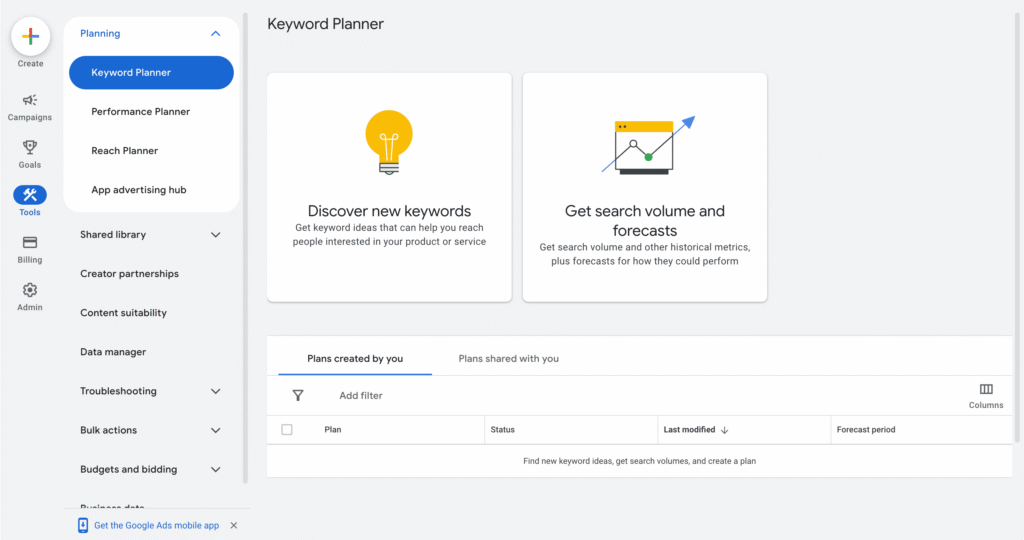
- Go to ads.google.com > Create account > Tools > Keyword Planner
- Select “Discover new keywords” > Enter your seed keywords
- Set Targeting: Location to Singapore and Language to English
Filter Results:
- “Avg. monthly searches”: 50+
- “Competition”: Low
- Export Keywords > Look for Singapore-specific terms:
- “QuickBooks Singapore pricing”
- “Xero for SMEs Singapore”
- Avoid global terms like “accounting software” (add “SG” or “Singapore”)
Our objective is to export a list of keywords into excel in .csv format, my sample over here.
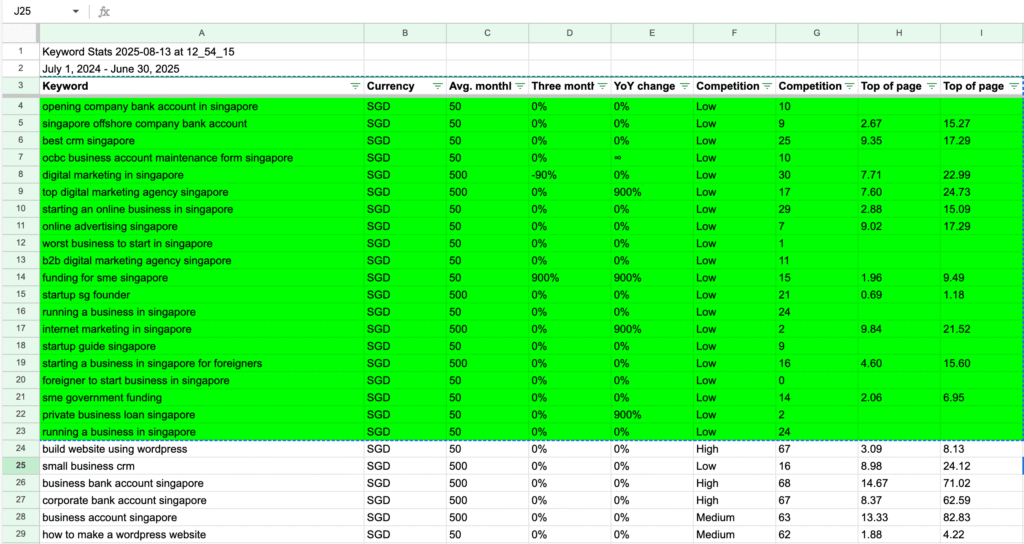
Target lower search volumn keywords
As our site is new, so authority is low. High-volume keywords (500+) in this niche are almost always dominated by big players like MoneySmart, SingSaver, or official vendor pages. A term like “accounting software” (1K+ searches) would be suicide to target in month one as we will be competing with Xero’s own site and established review giants. I will be aiming for traffic volumn between 100 to 500 range.
Commercial intent is better than research traffic
Furthermore, commercial intent changes the game. A 50+ search term like “Sleek accounting pricing” has way higher conversion potential than a 500+ search term like “how to register sole proprietorship.” The former is ready to buy; the latter is just researching. So every keywords that we can typically sort them into 4 categorgies base on their buyer journey.
- Navigational (no buying intent)
- Informational (research stage)
- Commerical intentional (searching for the right product)
- Transactional (want to buy & searching for payment discount)
Step up slowly focus on foundation
50 searches/month in Singapore is actually decent for our niche. If I can rank #1 for 20 of such keywords, that’s potentially 1,000 targeted visits monthly!!! We can farm on these low hanging fruits and once we range for these 20 keywords, we can always boarden with internal linking and improve domain authority.
Analysis using Deepseek and narrow down to 6
You can let deepseek to analysis these 20 keywords and filter down to 6. Let it compile into table and provide insights:
- top digital marketing agency singapore (500 searches, 900% YoY growth)
- internet marketing in singapore (500 searches, 900% YoY growth, low competition)
- starting a business in singapore for foreigners (500 searches, stable)
- private business loan singapore has 900% YoY growth + very low competition (index=2)
- startup sg founder can price bid aggressively as (CPC as low as SGD 0.69)
- b2b digital marketing agency singapore no bid data, suggest low advertiser competition—test them with low-cost SEO experiments.
Ubersuggest (Free 7 days trial)
Ubersuggest provide free 7 days trials are hidden under the monthly plan, you can’t find it under the yearly or lifetime plan. This will take you to the checkout page, where you’ll need to provide valid payment details.
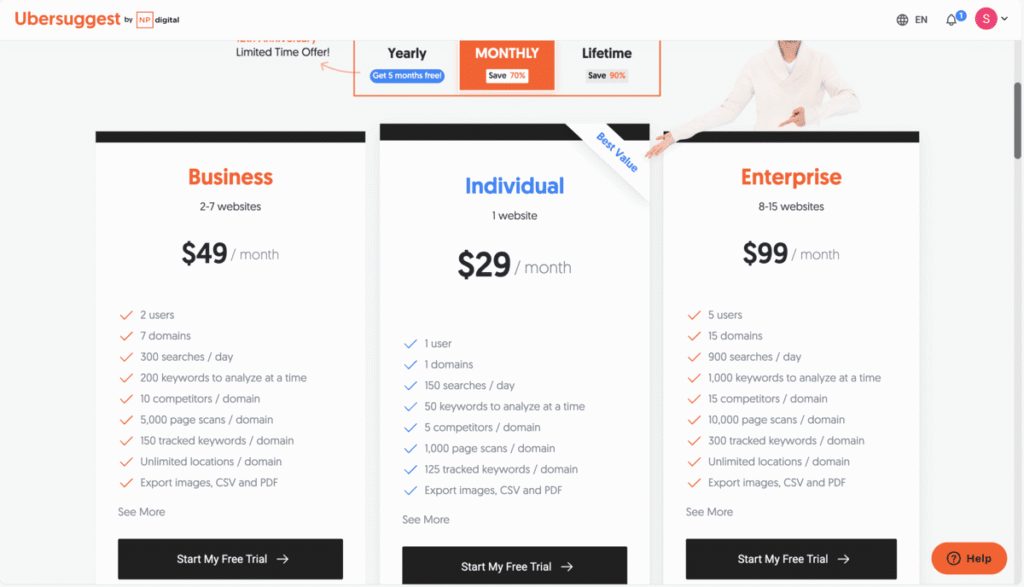
Check your first keyword
- Register a free account and sign in
- Under Keyword research > Keyword overview > Click the dropdown next to search bar > Select “Singapore”
- Enter your keywords and check 3 key metrics:
- Search Volume: Exact monthly searches in SG
- SEO Difficulty: Score out of 100 (target ≤40)
- CPC (Cost-Per-Click): Indicates commercial value
Analysis keyword details
- Scroll to “Keyword Ideas” > See related Singapore-specific phrases
- Check “Search Volume” column > Confirm exact SG volume
- Sort by “SD” (SEO Difficulty) > Lowest first
Your Action Plan
Test your 6 keywords now while logged in, your objective is to come up with at least 50 keywords short term to start writing content over the next 3 months.
- Look for:
- 100-500 search volume
- SEO Difficulty ≤40
- CPC > $5 (indicates commercial intent)
- Avoid keywords with “0” volume in SG location
My personal experience with Ubersuggest
What I do is to manual select those keywords that I am interest in more or less fit the requirements above. I had difficult to obtain 50 keywords so I had to go back to google keyword research file to get more 500+ traffic keyword and test them one by one.
I still don’t mange to get 50 keywords so I kept coming up with seed keywords that contain “Singapore” or geographical related like “GST”, “UOB”, “SME” etc. Finally I managed to come up with the outcome over here.
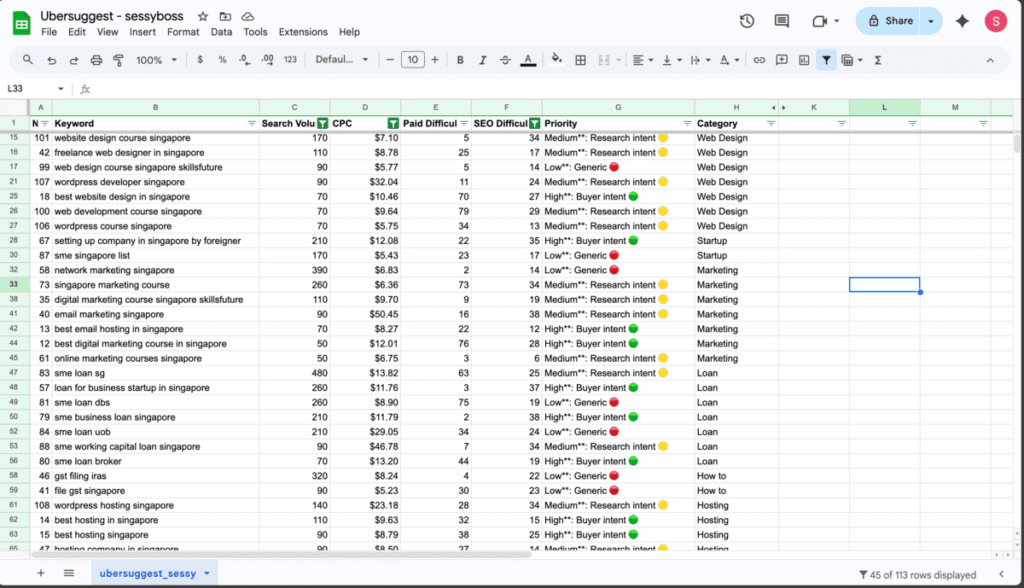
Use Ubersuggest’s “Competitor Analysis” on MoneySmart or SingSaver to steal their Singapore keywords!
After using ubersuggest for 7 days, there is an option to buy out the program for $299USD. But if you insist to cancel the subscription, it will pop up a last minute one time discount to use Ubersuggest for life for only $99USD. I find it is good value to pay one time and you are able to spy on your competitor and continue to check for keywords to rank for the early day.
Once you are using Ubersuggest, WAY2EARNING suggest you can affiliate the product for 5% – 10% recurring.
Google Trends (Free)
Next we can use google trends to validate and prioritize our keywords from Ubersuggest.
Take your top 20 keywords from Ubersuggest and go through them on google trends. Our goal is to confirm search demand, spot seasonality, and identify rising trends in Singapore.
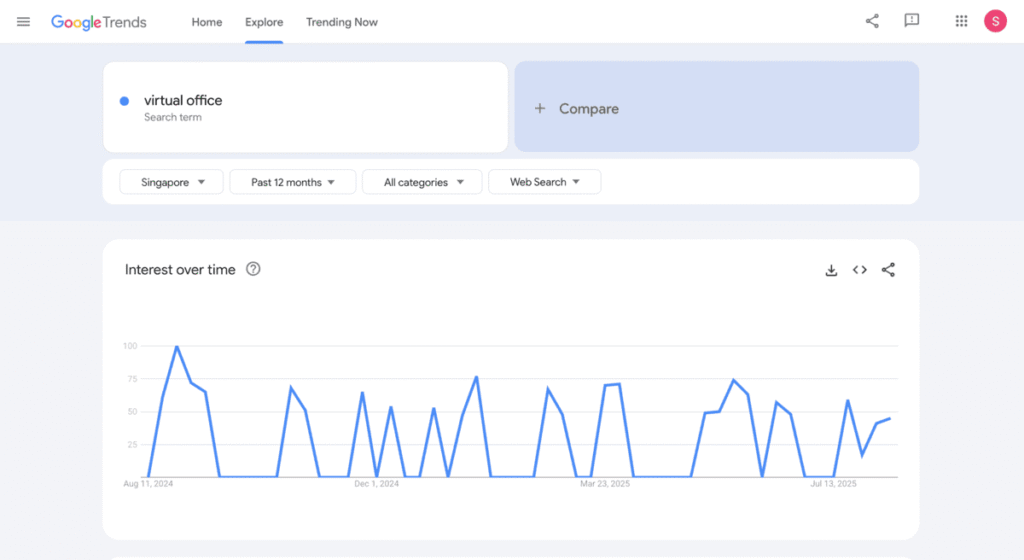
Check Search Volume Trends:
- Enter your top 20 Ubersuggest keywords into Google Trends.
- Filter: Location: Singapore + Time Range: Past 12 months.
- Look for:
- Upward trends (e.g., “SME grants Singapore” spiking during budget season).
- Seasonal peaks (e.g., “corporate bank account Singapore” surges in Q1 when new businesses launch).
- Action: Prioritize keywords with sustained or rising interest (e.g., “GST filing tools for freelancers SG” during year end).
Compare Keyword Groups:
- Use “Compare” to pit similar keywords (e.g., “Wix vs Shopify Singapore”).
- Example: If “Shopify Singapore” has 3x higher interest than “Squarespace Singapore,” focus content on Shopify.
Analyze Related Queries:
- Scroll to “Related queries” for your keyword.
- Filter by “Rising” to find breakout terms (e.g., “Xero accounting software for SMEs” ↑1,200%). Target these immediately.
AnswerThePublic
AnswerThePublic goal is to discover long-tail questions, pain points, and semantic variations. Registering without credit card to use 3 search per day.
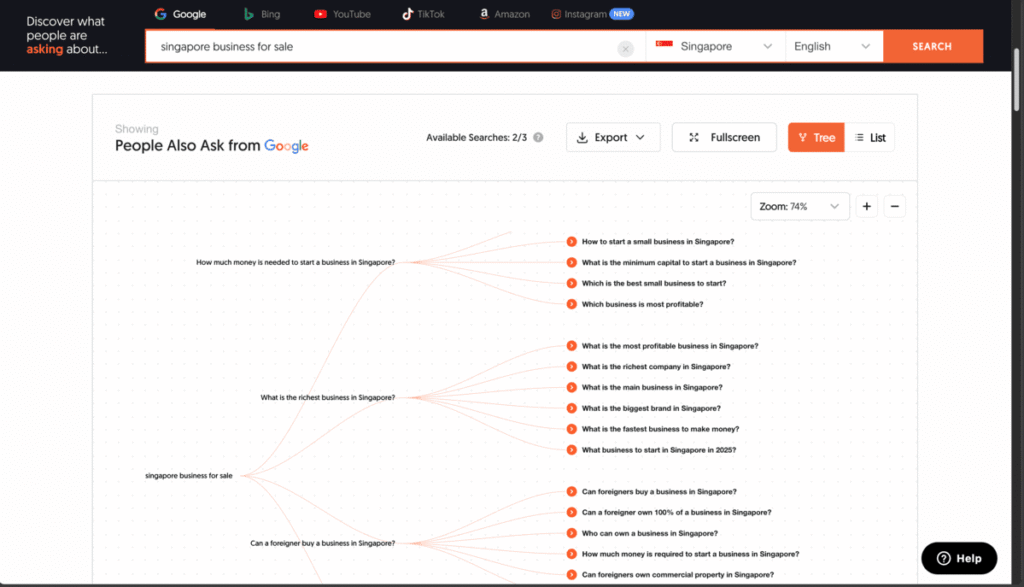
Run Seed Keywords:
- Take 5–10 top-priority keywords from Google Trends (e.g., “virtual office Singapore”).
- Input into AnswerThePublic → Set Region: Singapore.
- Export data as CSV for analysis.
Mine Question-Based Keywords:
- Focus on “Questions” section (e.g., “How to set up virtual office for foreigner in Singapore?”).
- These become blog titles (e.g., “A Step-by-Step Guide to Virtual Offices for Foreign Entrepreneurs in SG”).
Leverage Prepositions & Comparisons:
- Prepositions: “WordPress without hosting Singapore” → Guide on free website builders.
- Comparisons: “Xero vs QuickBooks Singapore” → Affiliate comparison post.
Conclusion
Once I had went through these 5 keywords research tools. I am able to move on to the next step which is content strategy phase where I will organizing these keywords into a topical cluster model rather than treating them as isolated articles. Follow my next articles.
